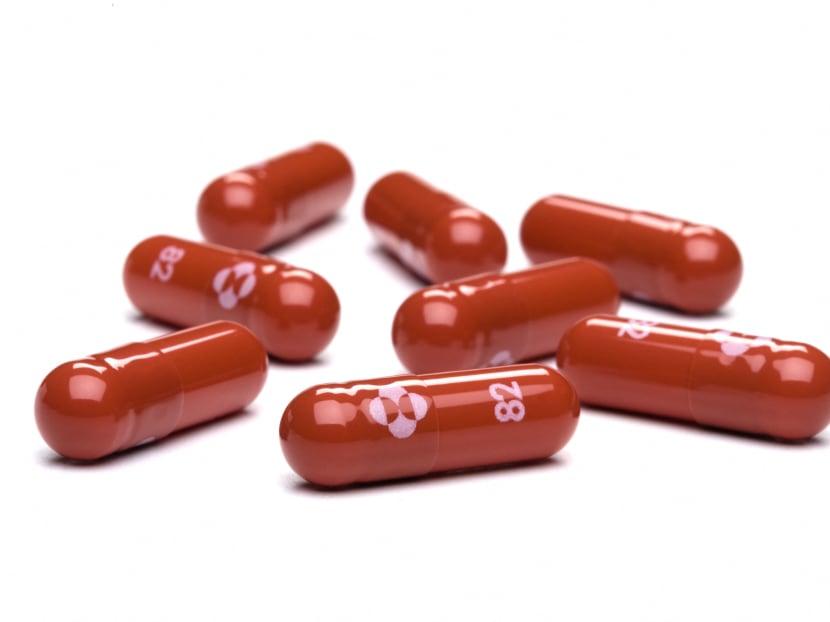US health panel endorses Merck Covid pill
WASHINGTON — A panel of health experts appointed by the United States (US) government voted to recommend Merck's Covid pill for high-risk adult patients, a new form of treatment that is easy to administer and could prove more able to withstand variants, including Omicron.

Merck released full results last week from a clinical trial of 1,400 people, which found the pill reduced the risk of hospitalisations and death by 30 per cent
WASHINGTON — A panel of health experts appointed by the United States (US) government voted to recommend Merck's Covid pill for high-risk adult patients, a new form of treatment that is easy to administer and could prove more able to withstand variants, including Omicron.
Molnupiravir, already authorized in Britain, has been shown to reduce the rate of hospitalizations and deaths among high-risk Covid patients when taken within five days of symptom onset.
The Food and Drug Administration (FDA), which convened Tuesday's (Nov 30) meeting, is expected to soon grant an emergency use authorisation (EUA), meaning millions of courses of the capsules will be stocked in pharmacies for patients with prescriptions.
But the final margin of victory — with 13 experts in favour and 10 against — reflected concerns over a recent downgrading of the treatment's efficacy results and fears over its potential harms.
"This was a difficult decision," said Dr Sascha Dublin, of the Kaiser Permanente Washington Health Research Institute.
Dr Dublin said that while she found the benefits compelling enough, it will be important to make sure the pill is strictly regulated and goes to patients best suited for the treatment.
Last week, Merck released full results from a clinical trial of 1,400 people, which found the pill reduced the risk of hospitalisations and death by 30 per cent — a significant result, but more modest than the earlier advertised 50 per cent, which was based on an analysis of half the number of patients.
The factors behind the drop in efficacy are not yet fully clear, but could be linked to variation in the underlying conditions among those studied.
Briefing documents uploaded by the FDA illustrated the fine benefit-risk balance the experts had to analyse.
Potential harmful effects were noted on fetal development, as seen in studies on rats and rabbits, and Merck said it would not recommend use in pregnant women.
The company did not seek authorisation for children, and the FDA said it didn't plan to carry out pediatric trials until safety is established in juvenile rats, with concerns about the impact on bone formation.
Merck's pill is expected to become the first authorised oral treatment for Covid-19 in the United States.
The most effective treatment are monoclonal antibodies, which are given by infusion and have been shown to reduce the risk of severe cases in high-risk patients by up to 70 per cent.
But it is far easier and less daunting for patients with prescriptions to get pills from a pharmacy than to go to an antibody infusion site where they will be placed on a drip.
TOXICITY CONCERNS
Merck's treatment is taken as four capsules, twice a day, over five days — for a total of 40 pills.
It was found to be safe in its clinical trial, with non-serious adverse events such as diarrhea and dizziness occurring roughly equally between the placebo group and the drug group.
Molnupiravir, which was developed in partnership with Ridgeback Biotherapeutics, works by introducing mutations into the genetic material of the coronavirus, inhibiting its ability to replicate.
It is thought likely to be more variant-proof than monoclonal antibodies or vaccines, because unlike them, it does not target the ever-mutating spike proteins that dot the surface of the virus.
The Omicron variant has more than 30 mutations on this protein, the so-called "business end" of the virus that it uses to invade our cells.
But molnupiravir's error-driving mechanism also comes with certain concerns.
Some experts have said it could harm mammal DNA, which could in turn cause cancer or damage sperm. But in its presentation, the FDA said rat studies showed the effect was negligible.
Another worry is whether the mutations the pill introduces might lead to a dangerous evolution of the virus itself, spurring new variants.
This is "currently a theoretical concern," the FDA said in its slides, with no worrying mutations seen so far. But many of the experts who voted no said they were not yet convinced.
Pfizer's Covid-19 pill, which cut hospitalisations and deaths by nearly 90 per cent, works differently: instead of causing mutations, it blocks an enzyme needed for viral replication.
The US government has committed to buying 3.1 million courses of molnupiravir for approximately $2.2 billion, with the option to purchase more. AFP









